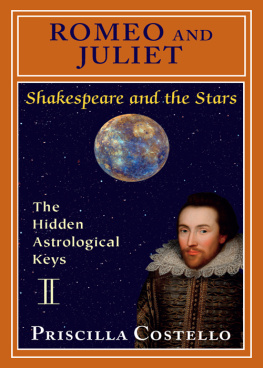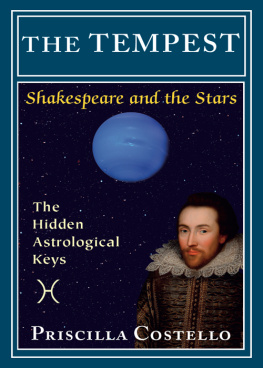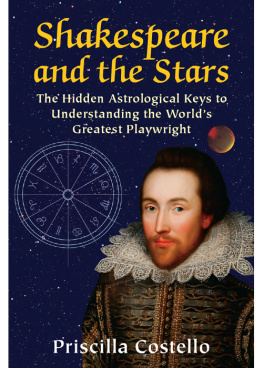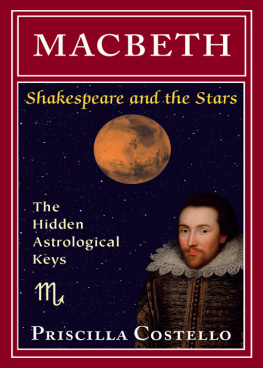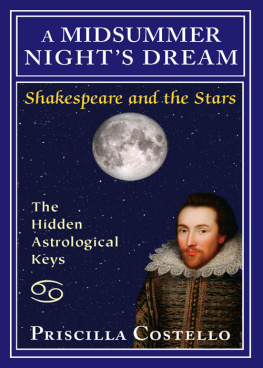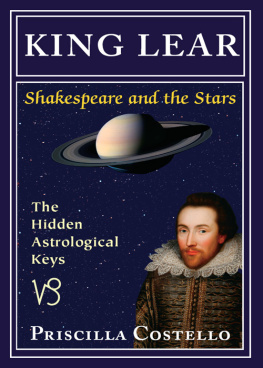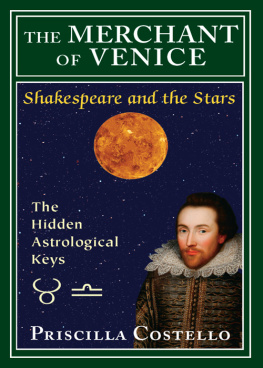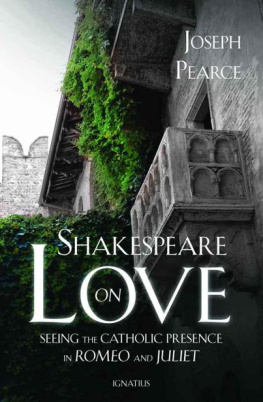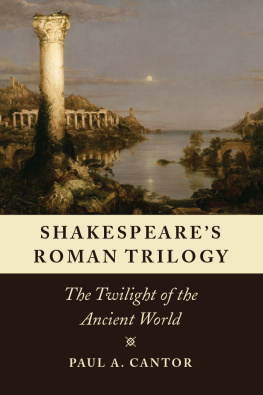
Great works of literature are like stars;
they stay put, even as we draw them
into new constellations.
Adam Kirsch

Published in 2018 by Ibis Press
A division of Nicolas-Hays, Inc.
P. O. Box 540206
Lake Worth, FL 33454-0206
www.ibispress.net
Distributed to the trade by
Red Wheel/Weiser, LLC
65 Parker St. Ste. 7
Newburyport, MA 01950
www.redwheelweiser.com
Copyright 2018 by Priscilla Costello
All rights reserved.
No part of this publication may be reproduced or transmitted
in any form or by any means, electronic or mechanical, including
photocopying, recording, or by any information storage and retrieval
system, without permission in writing from Nicolas-Hays, Inc.
Reviewers may quote brief passages.
ISBN 978-0-89254-182-9
Ebook: ISBN 978-0-89254-649-7
Library of Congress Cataloging-in-Publication Data
Available upon request
Book design and production by STUDIO 31
www.studio31.com
Cover painting: the Cobbe portrait, ca. 1610
Smile retouch by Mimi Alonzo
Photo of Mercury by NASA
Cover design by STUDIO 31
Printed in the United States of America
[MG]
www.redwheelweiser.com/newsletter
Contents
GENERAL INTRODUCTION: DID SHAKESPEARE REALLY USE ASTROLOGICAL SYMBOLS?
It is the sTARS,/ The sTARS above us,
govern our conditions... (King Lear)
Methinks it should be now a huge
eclipse/ Of sun and moon... (Othello)
I know thy constellation is right apt
for this affair. (Twelfth Night)
S hakespeare's works are filled with references like these to heavenly bodies and stellar events. This isn't surprising since people of his time were more aware of the skies and the stars than we are: with no electric lights and few clocks, farmers, mariners, and the average Elizabethan looked to the sky to determine time and weather. Since personalities were classified in relation to specific planets (an early form of psychology) and medical practice was based on planetary types (or temperaments), the meanings of the astrological symbols were familiar to them.
For the illiterate (the majority) oral traditions passed down for generations made the astrological language familiar. The literate read yearly almanacs in English listing astrological omens. Educated Elizabethans grasped astrology's more profound implications since astrological language appeared frequently in religious writings. Steeped in the classical literature of ancient Greece and Rome, they knew that astrology is an integral part of an elegant, sophisticated, and intelligently-thought-out spiritual philosophy whose language and symbolism had been transmitted through the centuries and were part of lively discussion well into the 17th century (and still are today).
Like the members of Shakespeare's audience, his characters are also familiar with astrology.
His dramatis personae speak of stars, planets, comets, meteors, eclipses, planetary aspects, predominance, conjunction, opposition, retrogradation, and all sorts of astro-meteorology. They know that the Dragon's Tail exerts an evil influence, that Mercury governs lying and thievery, that Luna [the Moon] rules vagabonds and idle fellows, that Saturn is malignant and Jupiter benevolent, that the signs of the zodiac rule the limbs and organs of the body, that planets influence cities and nations... Although they do not go into details regarding the technical workings of the science, his characters on the whole seem to possess a general knowledge of stellar influence on human destiny. Johnstone Parr
We don't catch many of the astrological allusions in Shakespeare's plays and understand their significance because we're no longer steeped in the grand worldview that was fundamental to Elizabethan thinking. We're conditioned in our time by the dominant beliefs of conventional materialistic science: that only physical things are real and that the only way to acquire knowledge is through five-sense perception. But for hundreds of years before Shakespeare's time the dominant paradigm was of a universe unfolding from Divinity in an orderly progression of hierarchical levels, down through the realm of the fixed stars, through the crystalline spheres of the seven classical planets, and ultimately into the physical world of human beings, animals, plants, and minerals. The fact that the planets are an integral part of this worldview justifies looking at Shakespeare's plays through the lens of astrology.
Each level is linked with all the levels above and below it, so that references to the planets trigger a host of associations on all the other levels. In a worldview in which the heavens are reflected on Earth and the realm of Earth mirrors the heavens, it is natural to see a connection between the glorious Sun that dominates the skies and the King who is the focus of court and country. Shimmering moonlight is symbolically reflected in the sheen of silver. Because this worldview allows for sympathetic resonances between all levels of creation, Shakespeare can write of tempests both external to King Lear and within his mind, of eclipses that portend the fall of kings, and of horses that eat each other when Macbeth murders King Duncan. Events on one level of being can reflect events on another.
Since Shakespeare's works reflect this generally accepted worldview, the vast majority of his characters' statements are overwhelmingly in line with the Renaissance astrological worldview familiar to his audience. Shakespeare naturally draws on familiar astrological symbolism as creative inspiration for his art, in both obvious and subtle ways. He uses it for various purposes: to establish time and its passage; to create characters in line with planetary associations; and to allude to themes and philosophical ideas embedded in these symbols. Most of his plays focus on one particular sign of the zodiac and its associated ruling planet with the key of the piece being conveyed by the language and allusions in the first (or second) scene.
The following discussion of this particular play (books by the same author about other Shakespearean plays are also available) begins with a summary of the story, and then reveals the play's key: the zodiacal sign and its associated planet. The main part uncovers the connections between aspects of the play and relevant astrological symbols, considering their significance from different perspectives and on different levels. Important key words are CAPITALIZED to make it easy for readers to identify core ideas associated with the sign and planet.
Since the worldview of Shakespeare's time is so comprehensive, his allusions are wide-ranging, encompassing the heavenly spheres, the human world on all its levels, and the world of nature. My explorations are equally wide-ranging: they include the mythological, the psychological, the philosophical, the religious or spiritual, the esoteric, and of course the mundane (references to gems and minerals, plants and animals, weather conditions, and even separate parts of the human body that were all correlated with the heavens).
I hope that the resulting wide-ranging discussion will intrigue perceptive play-goers and eager readers of Shakespeare's works who wish to explore their hidden depths from a new and different perspective, one that provides fresh insights into Shakespeare's extraordinary creations. His capacious consciousness, combined with literary craft, midwived a unique body of work that could only have been produced at that particular time by an individual having an unusual combination of literary artistry, astute perception, and vivid imagination, along with a profound understanding of philosophical, esoteric, and spiritual wisdomwhich includes astrology. It is this combination of gifts and talents that has made his works vital and intriguing for over four centuries.
Next page
